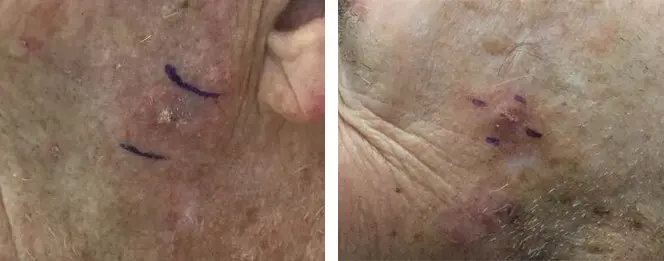Same-day Appointments
Tele-medicine Appointments

- ABOUT US
- GENERAL DERMATOLOGY
- SKIN CANCER
- COSMETIC DERMATOLOGY
- BLOG
- PATIENT RESOURCES
- LOCATIONS
- ONLINE PAYMENT
- ONLINE APPOINTMENT
Squamous Cell Carcinoma (SCC) is a common type of skin cancer that originates in the squamous cells, which are thin, flat cells that make up the outermost layer of the skin (epidermis). Squamous Cell Skin Cancer is typically caused by cumulative exposure to ultraviolet (UV) radiation from the sun over time, making it more common on sun-exposed areas, such as the face, ears, neck, hands and arms.
At 360 Dermatology we recommend regular skin self-examinations, professional skin checks and sun protection measures (such as wearing sunscreen and protective clothing) for early detection and prevention of SCC. If you notice any unusual or changing skin lesions, it’s important to consult a dermatologist for evaluation and appropriate management.
Understanding the origins of SCC is crucial for prevention and early detection. Here is a list of causes and risk factors:

*Individual Results May Vary
SCC often appears as a scaly or crusty lesion with the potential to invade deeper layers of tissue if left untreated. It may start as a precancerous growth called actinic keratosis, which can progress into SCC if not addressed. While it is usually localized and treatable when detected early, it can become more aggressive and potentially spread to other parts (metastasize) if left untreated or not caught in the early squamous cell skin cancer stages.
Treatment for Squamous Cell Skin Cancer varies based on factors such as identifying types of squamous cell skin cancer, stage and location. Several options exist, each tailored to specific circumstances. Surgical excision involves removing the tumor along with a margin of healthy tissue. Mohs Micrographic Surgery, a precise technique, ensures cancer removal while preserving surrounding healthy skin. In cases where surgery isn’t feasible or when SCC has spread, radiation therapy is used to target cancer cells.
The choice of treatment is determined on a case by case basis. Our expert physicians will always push for optimal outcomes, focusing on both health and appearance preservation.
Staging is a critical aspect of diagnosing and treating SCC. The squamous cell skin cancer stages help Dr. Aparna Ambay determine the extent of the disease and guide treatment decisions. SCC is typically staged from 0 to IV, with subcategories further defining the severity of the cancer:
If you notice any suspicious skin changes or squamous cell skin cancer symptoms or have concerns about your skin, consult with a dermatologist who can assess your condition and recommend appropriate diagnostic and treatment strategies tailored to your specific stage. Early detection remains the key to successful skin cancer management. Contact 360 Dermatology for diagnosis, treatment and care in Tampa.
With an estimate of almost 2 million new cases annually in the U.S., SCC is a significant health concern. However, early diagnosis results in a 95% five-year survival rate for localized SCC. Vigilance and timely treatment for squamous cell skin cancer are key to favorable outcomes.
Dr. Ambay, a distinguished dermatologist at 360 Dermatology, is the preferred choice for SCC care. She is one of few Mohs surgeons in Tampa. Her technique ensures precise removal and optimal cosmetic outcomes for squamous cell skin cancer patients. Book an appointment at any of our Tampa locations for the best skin cancer prevention and care: Wesley Chapel, Land O’Lakes, Trinity, Spring Hill or Clearwater.

Written by 360 Dermatology Medical Experts
Meet the Team